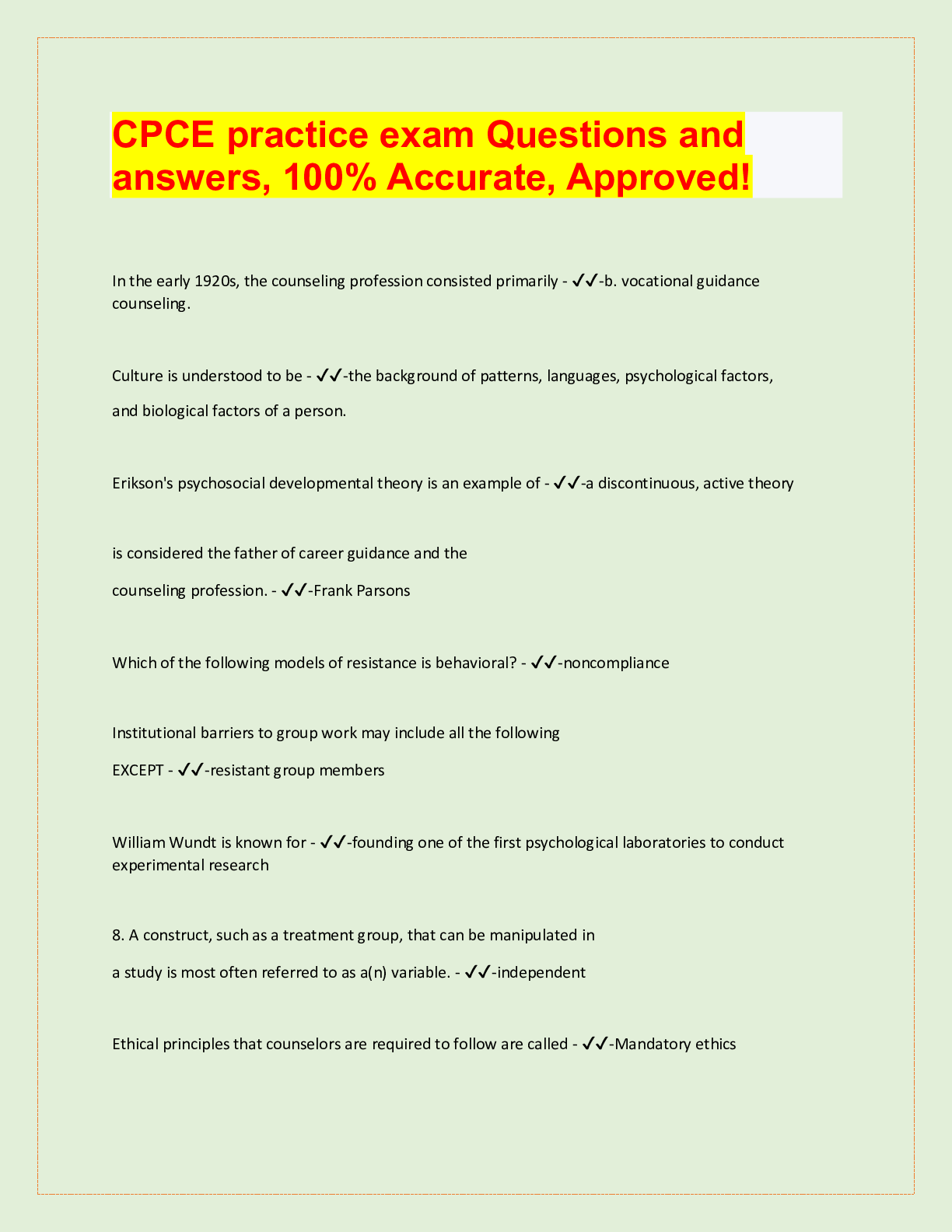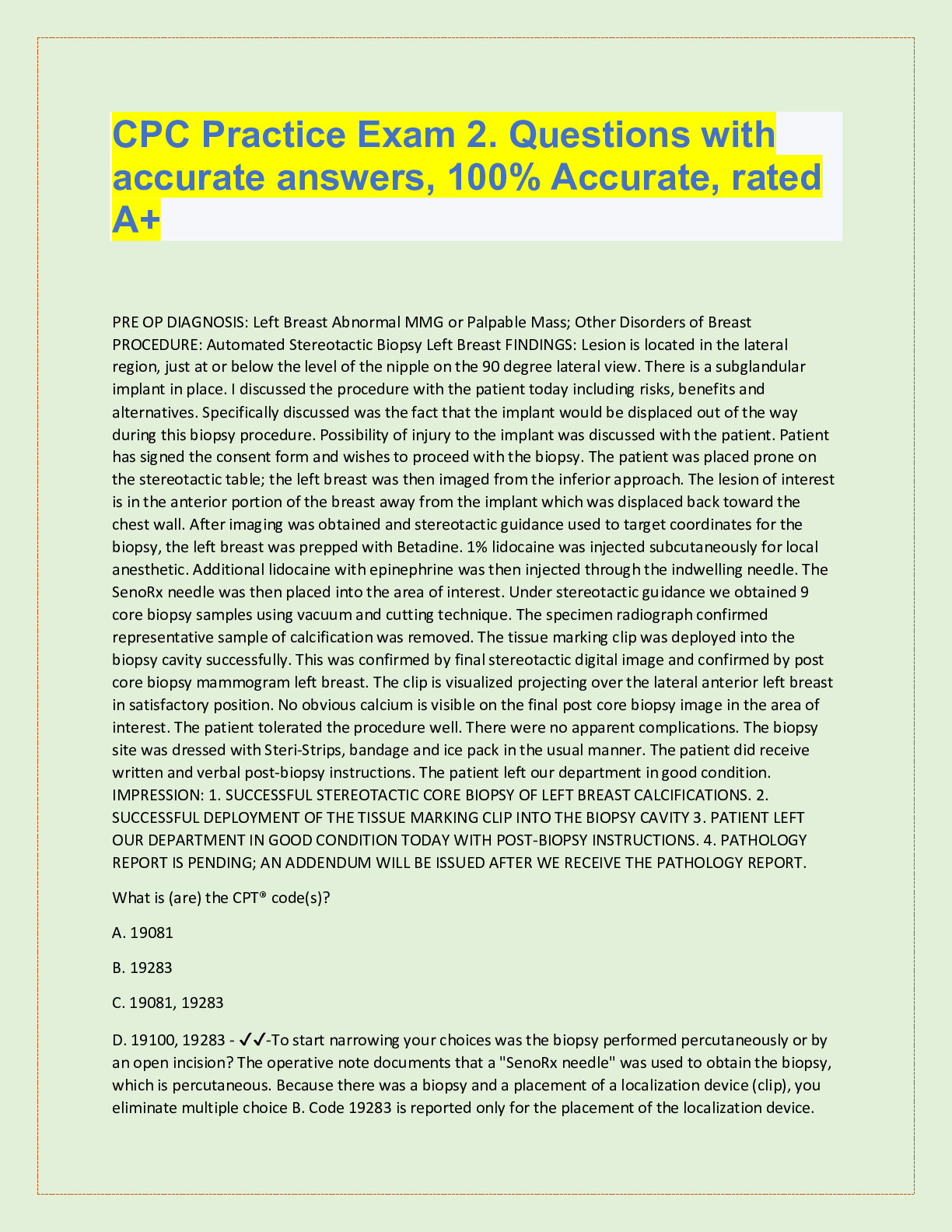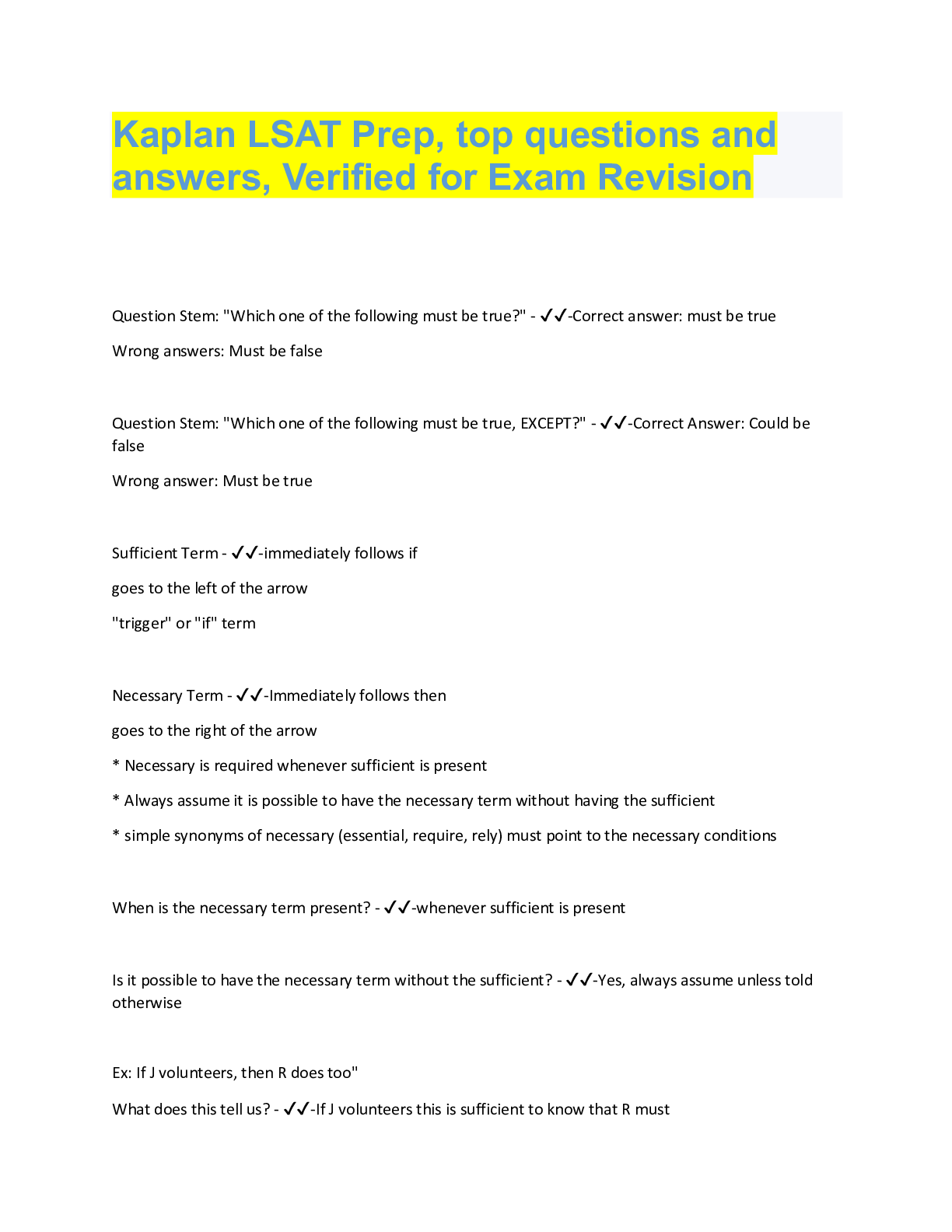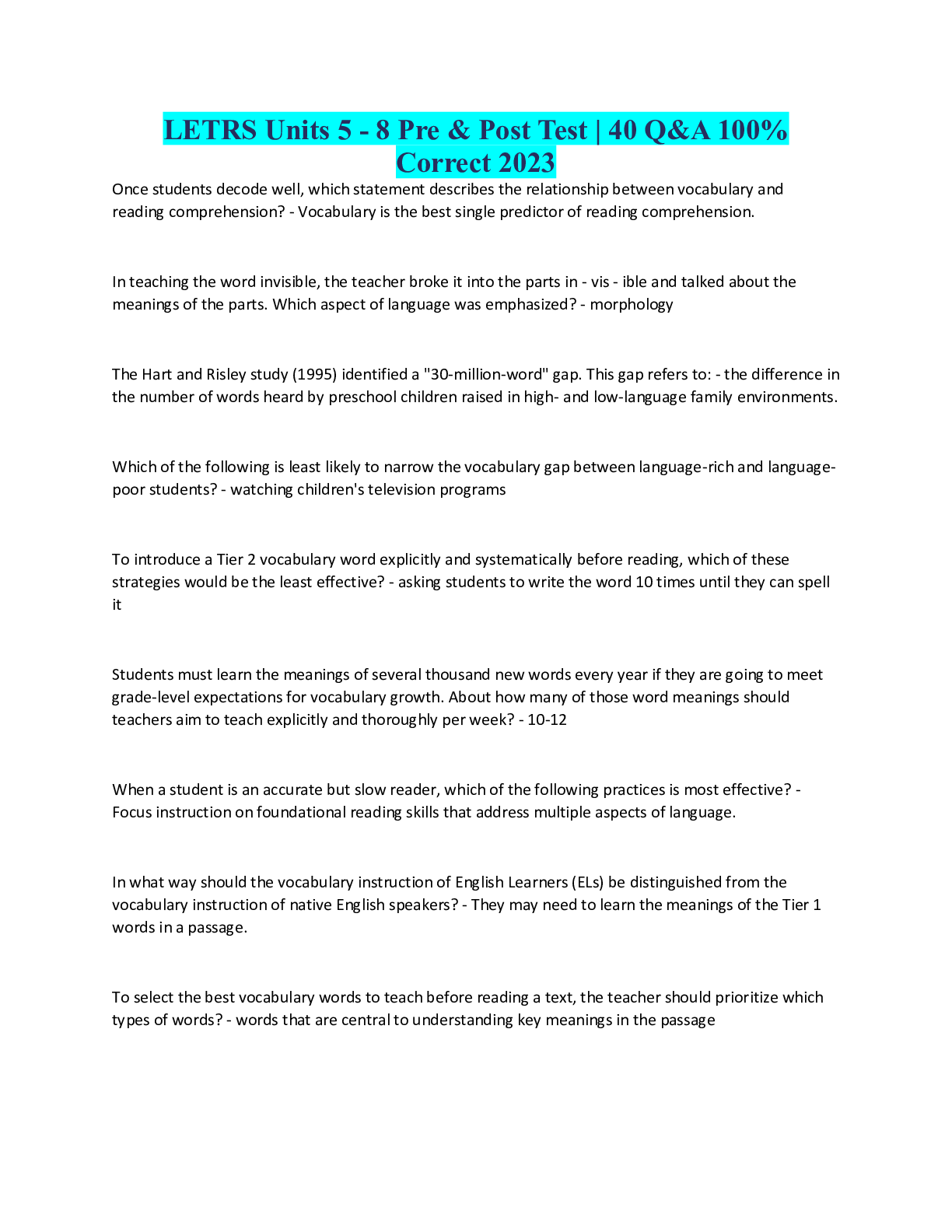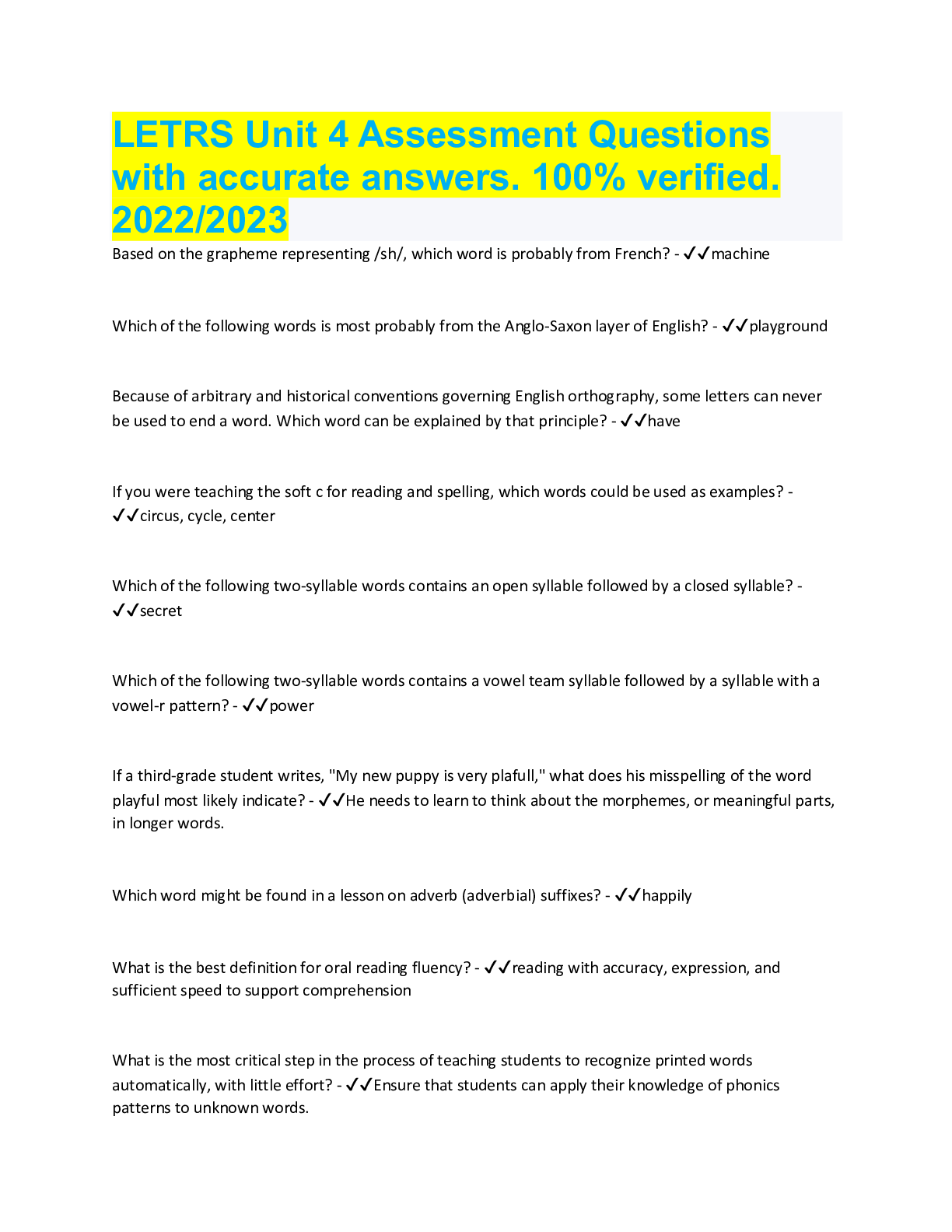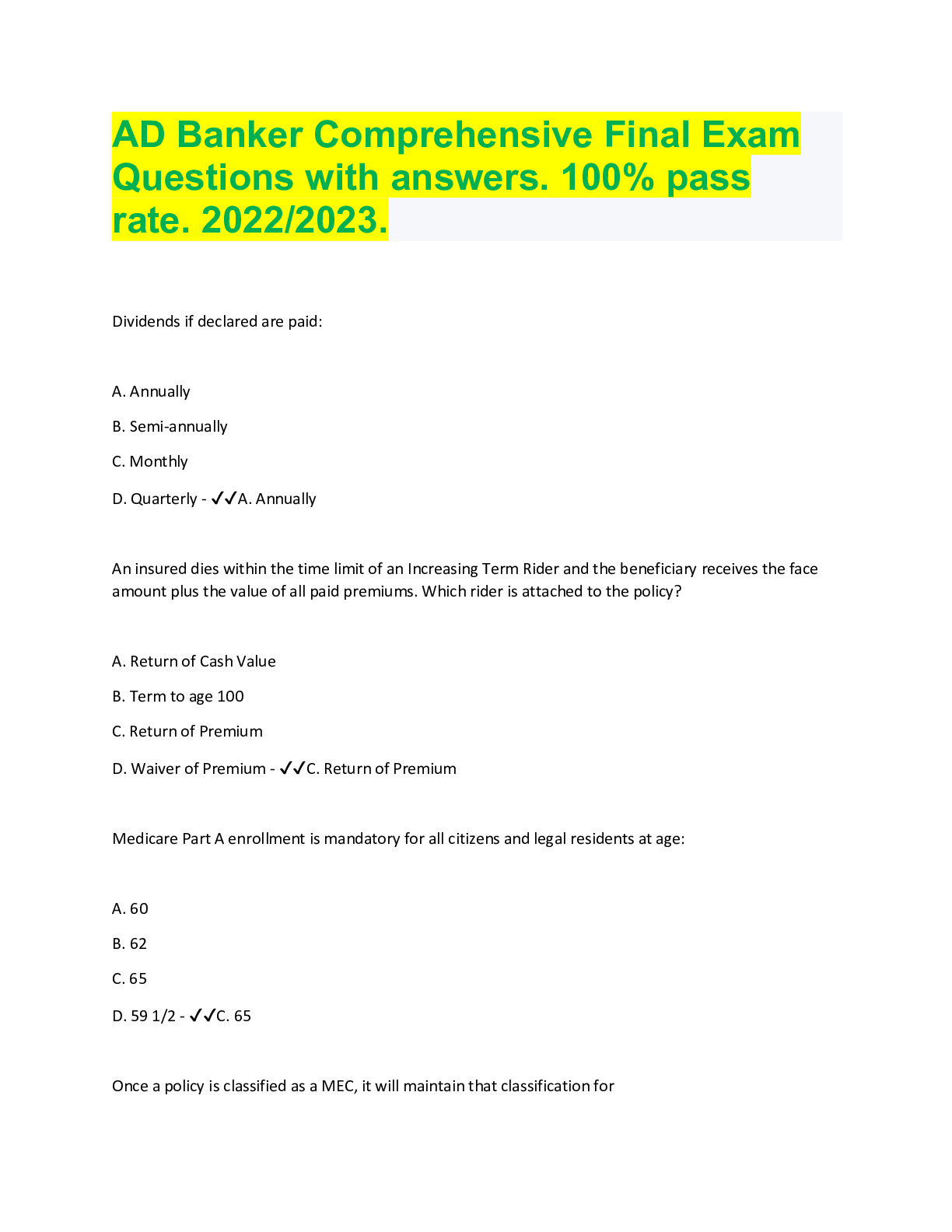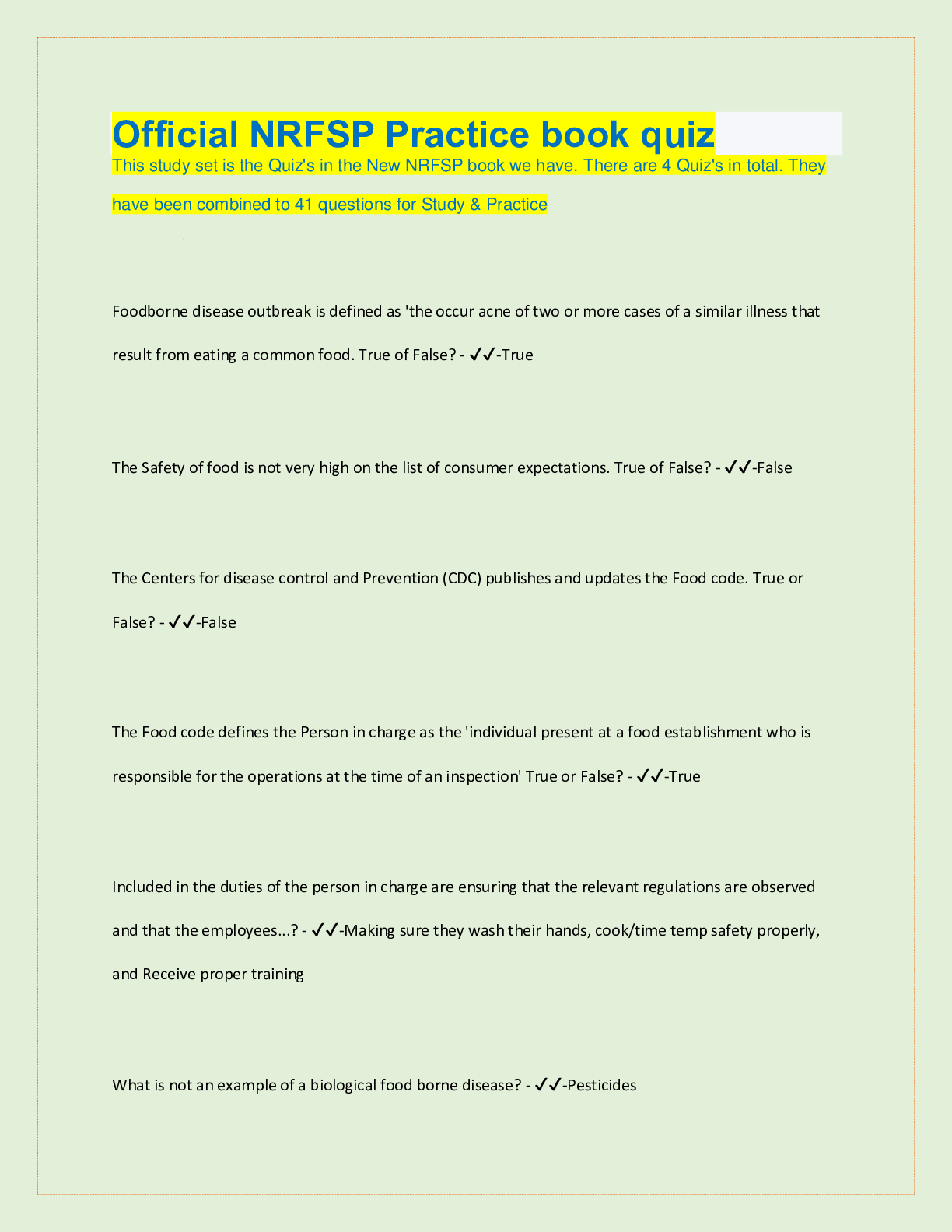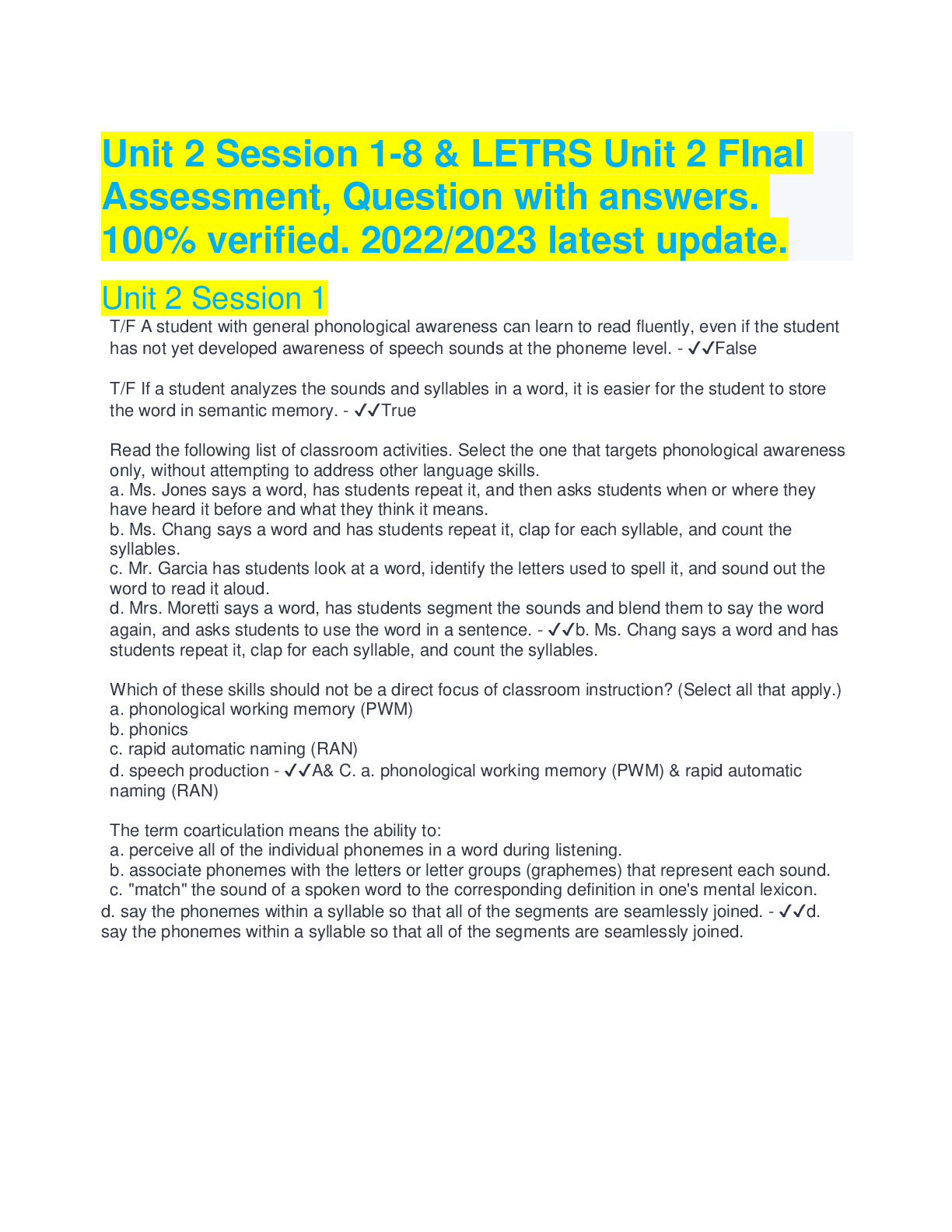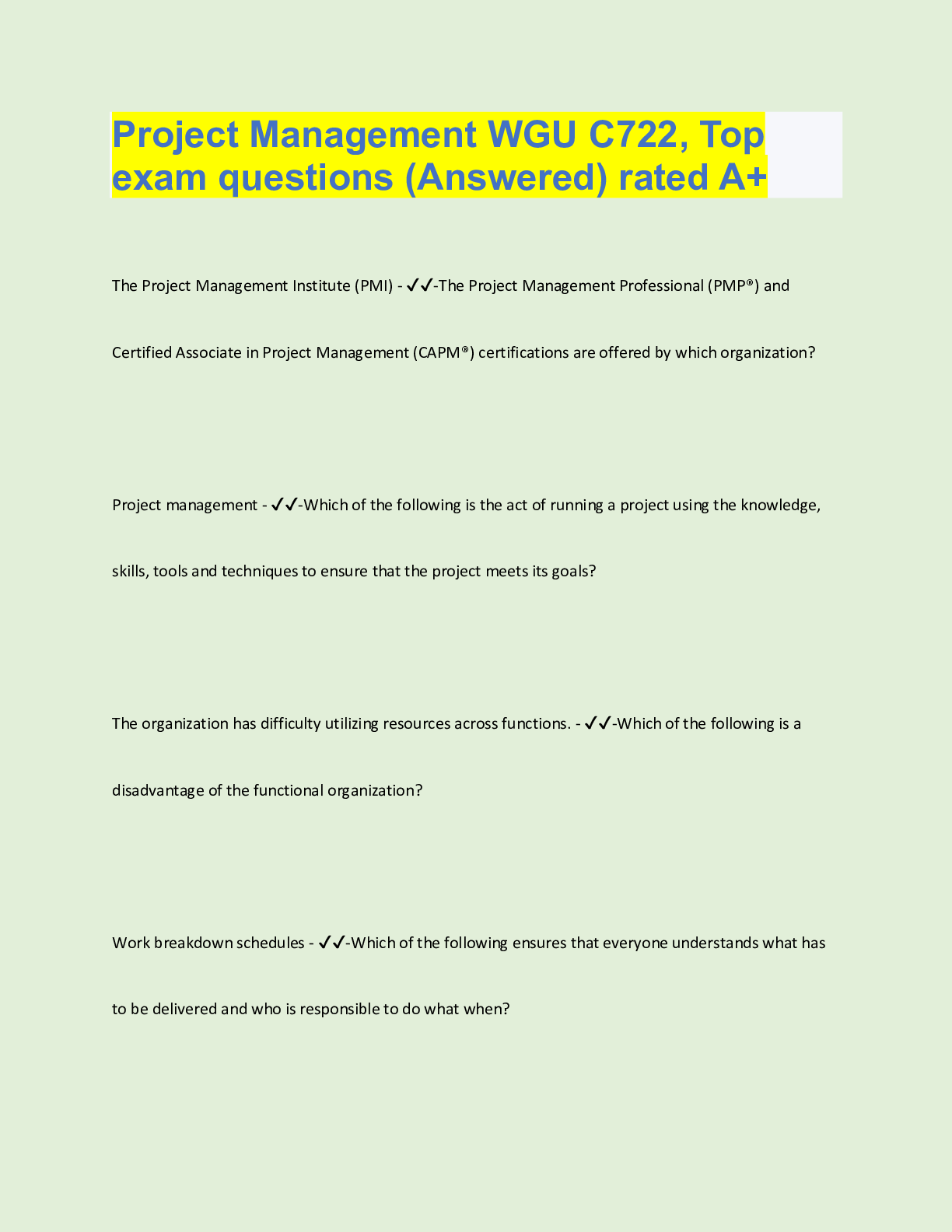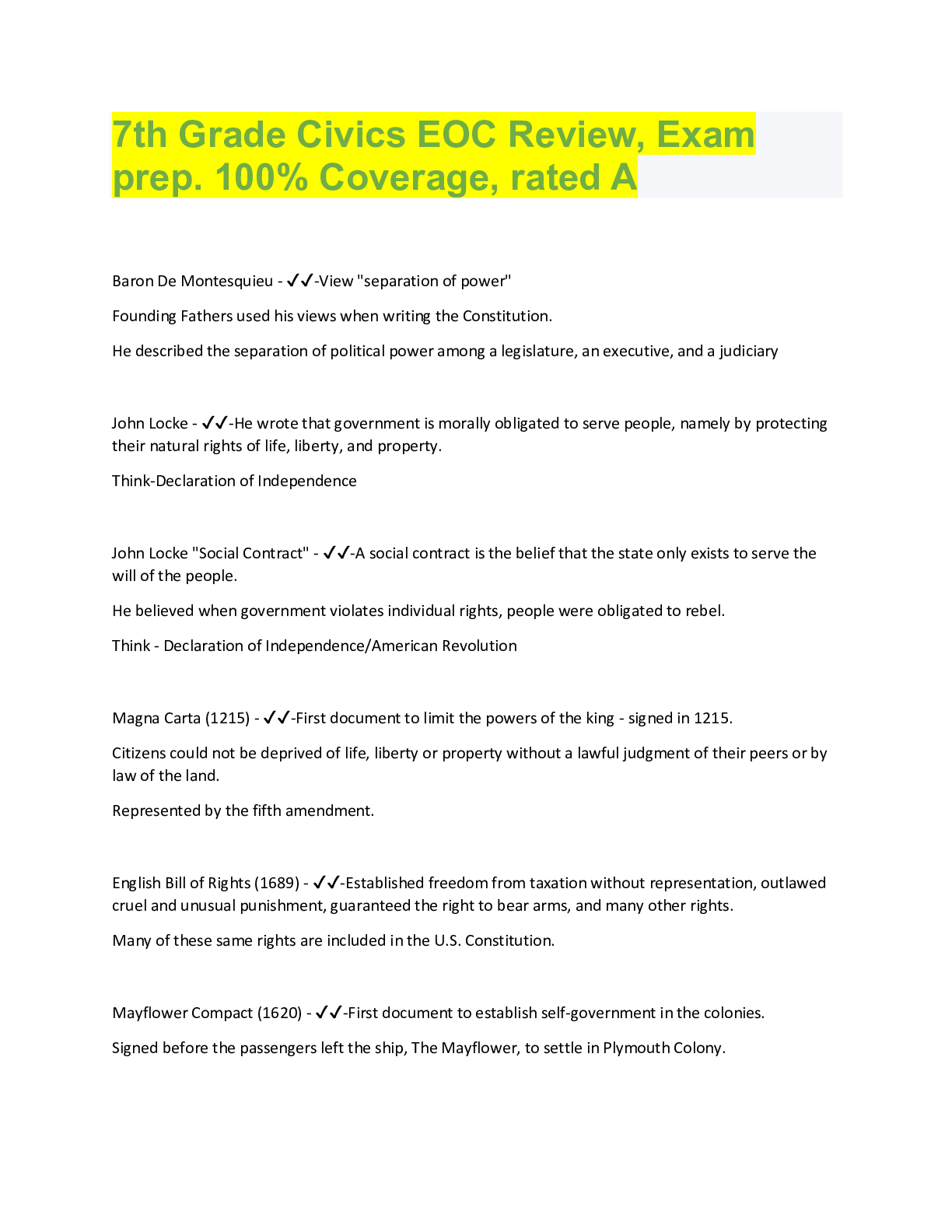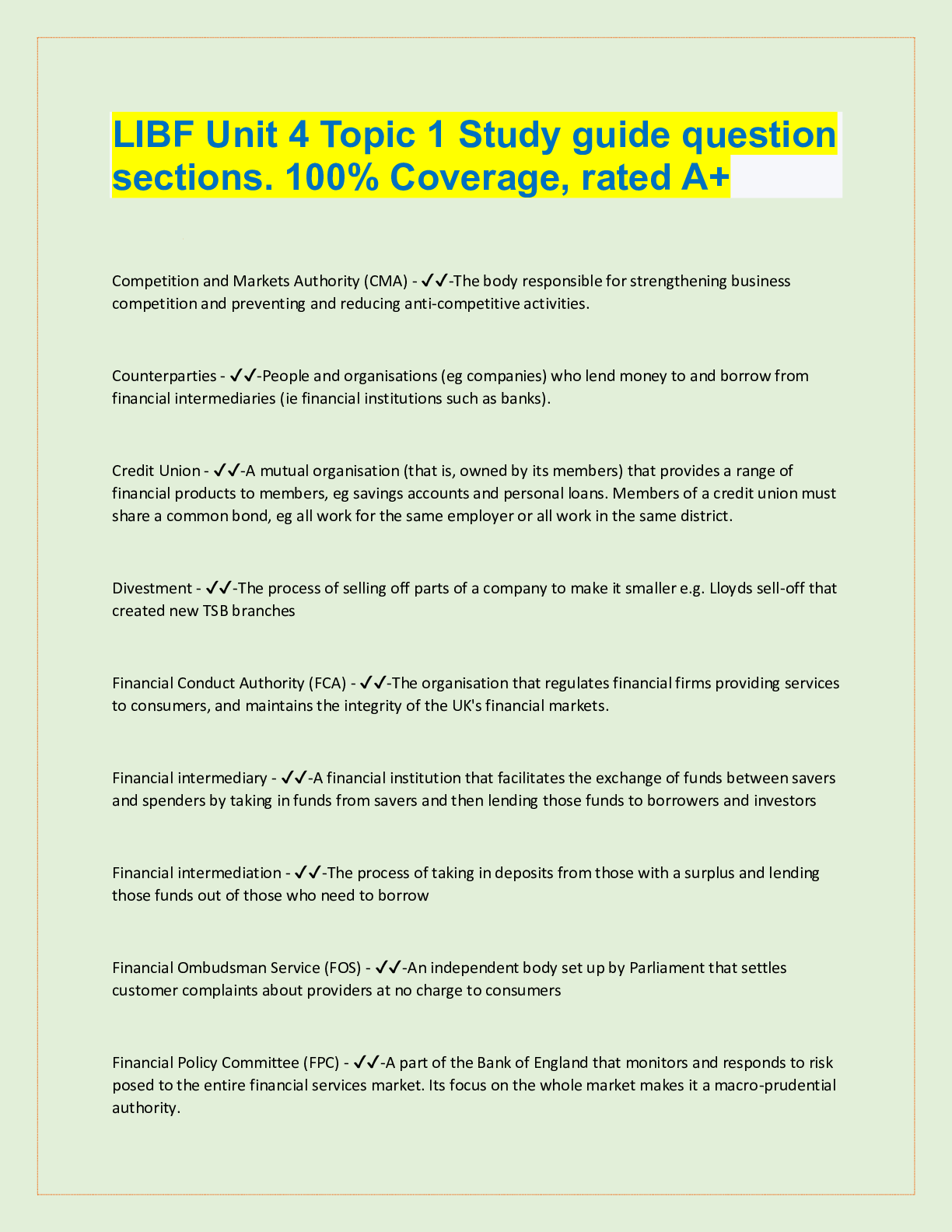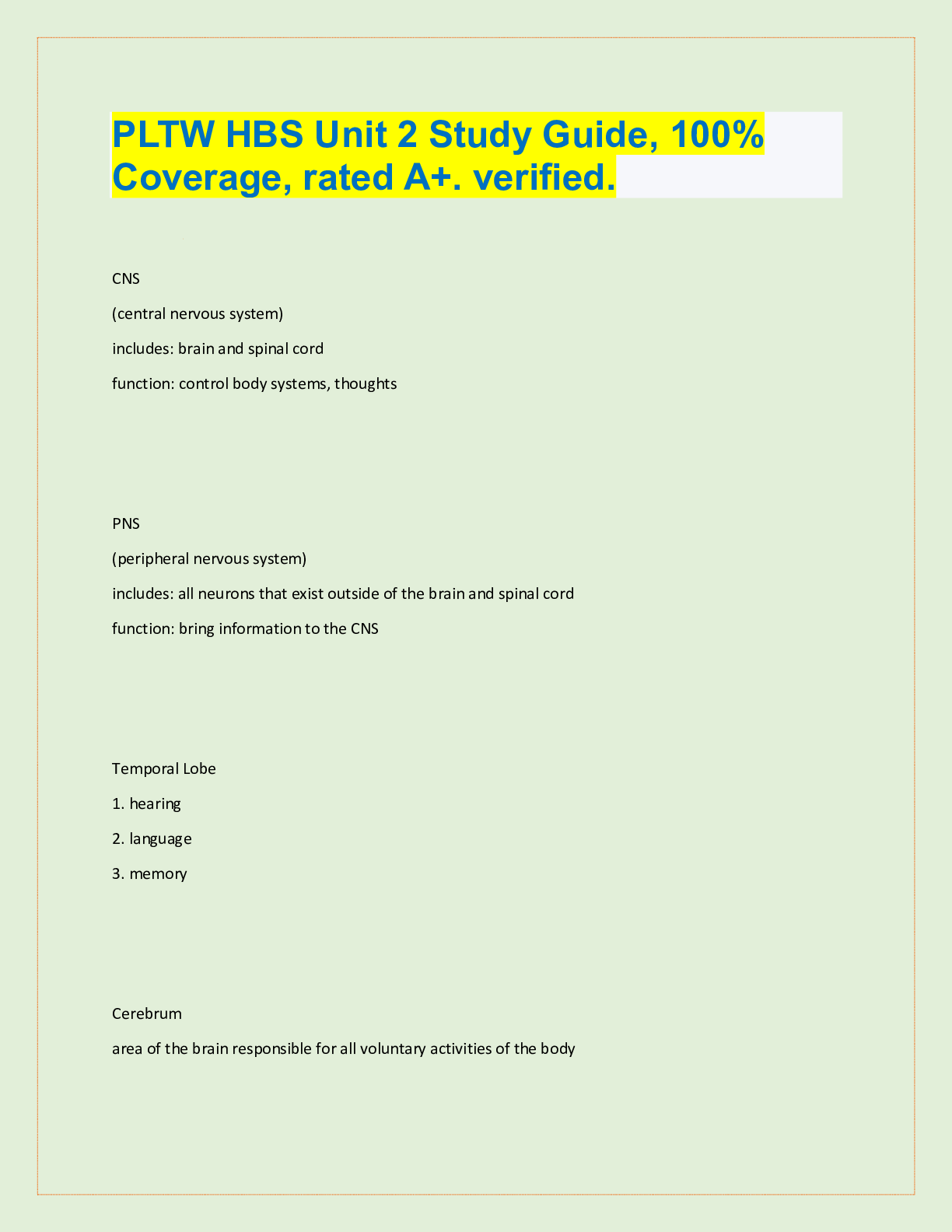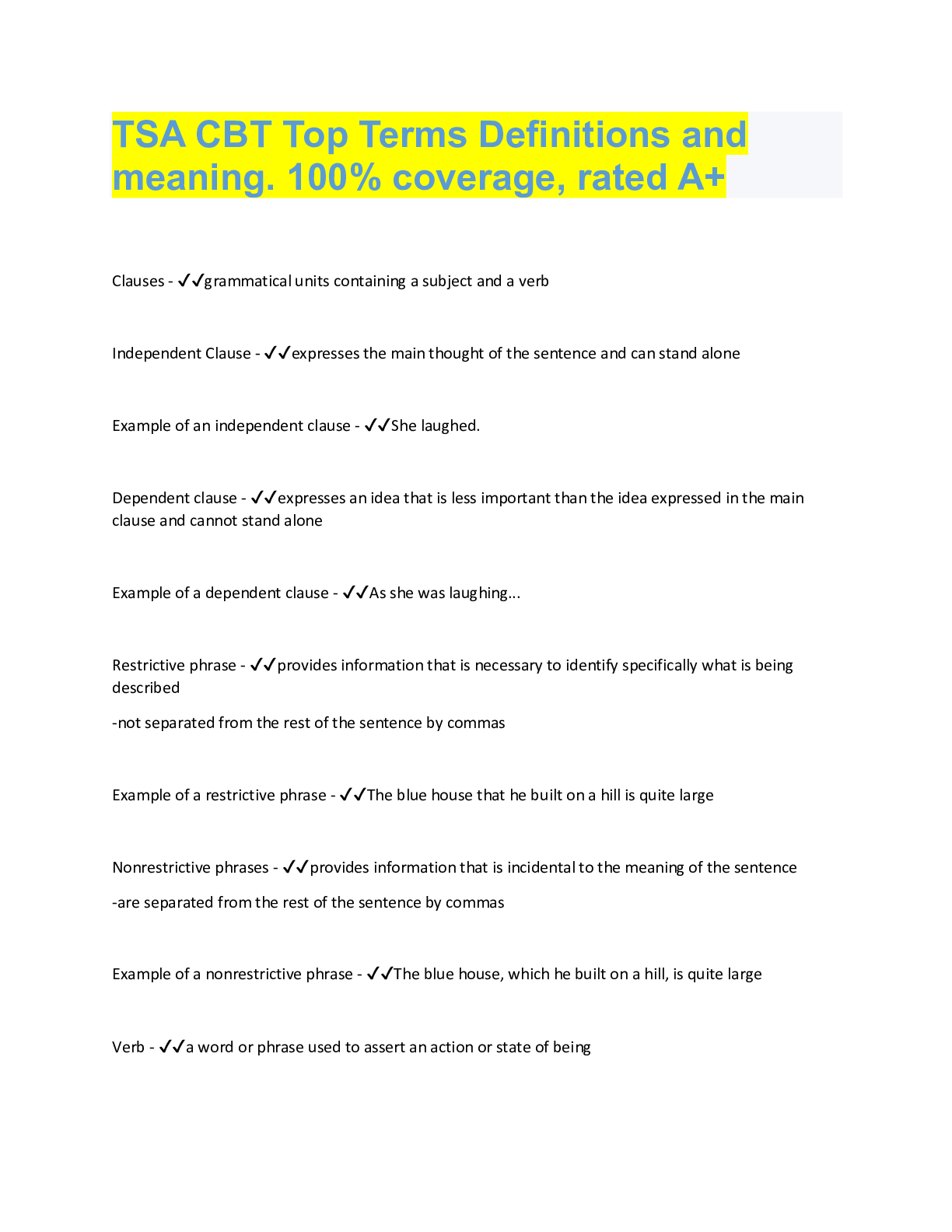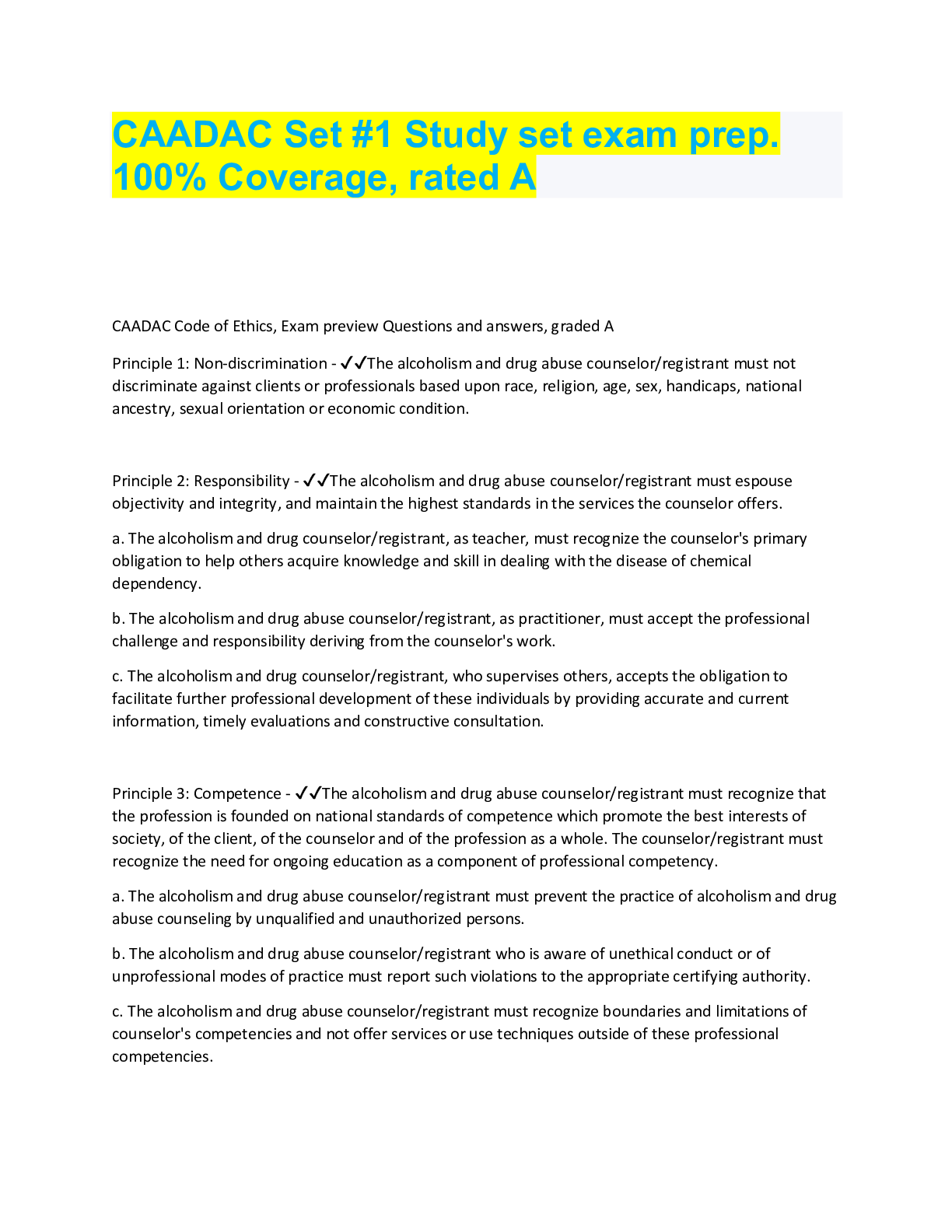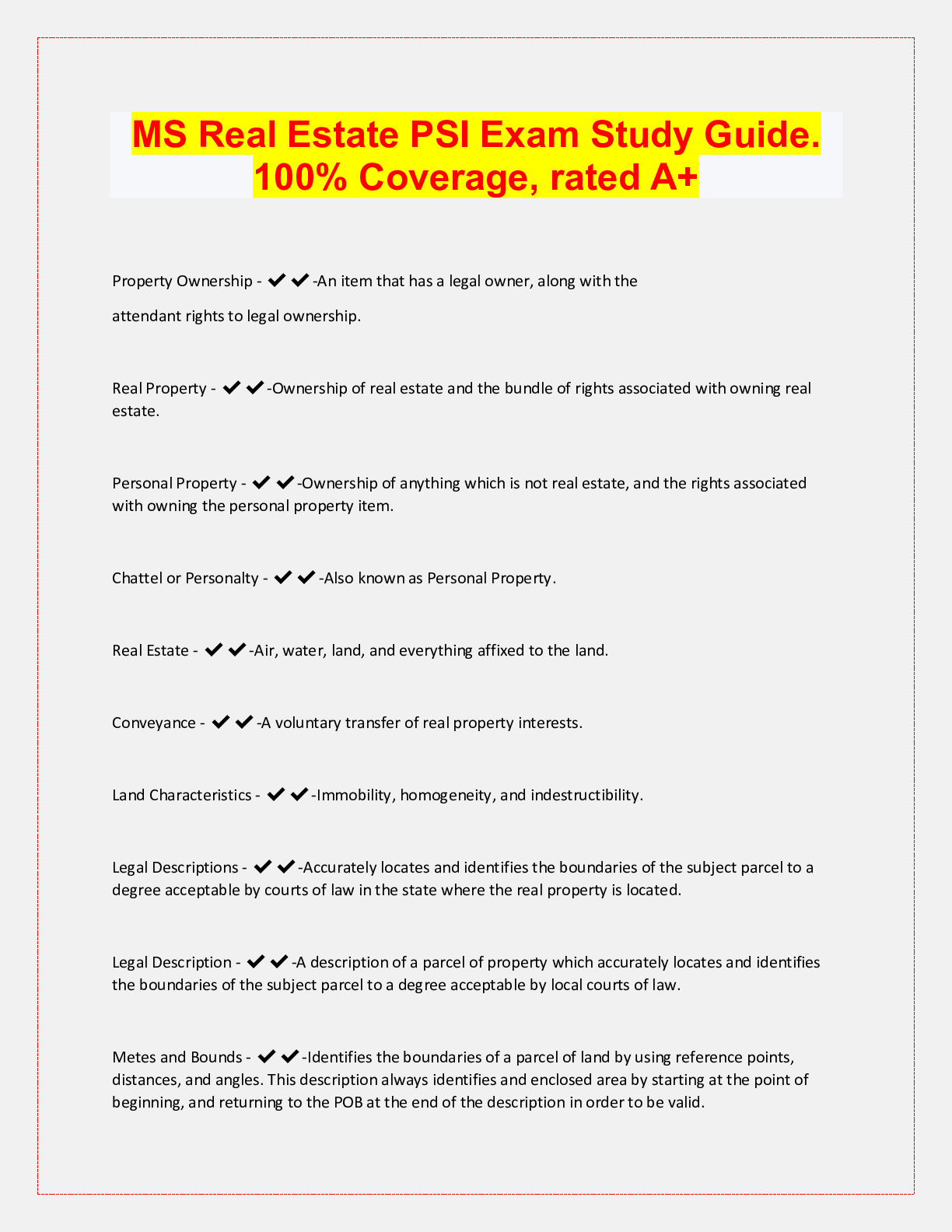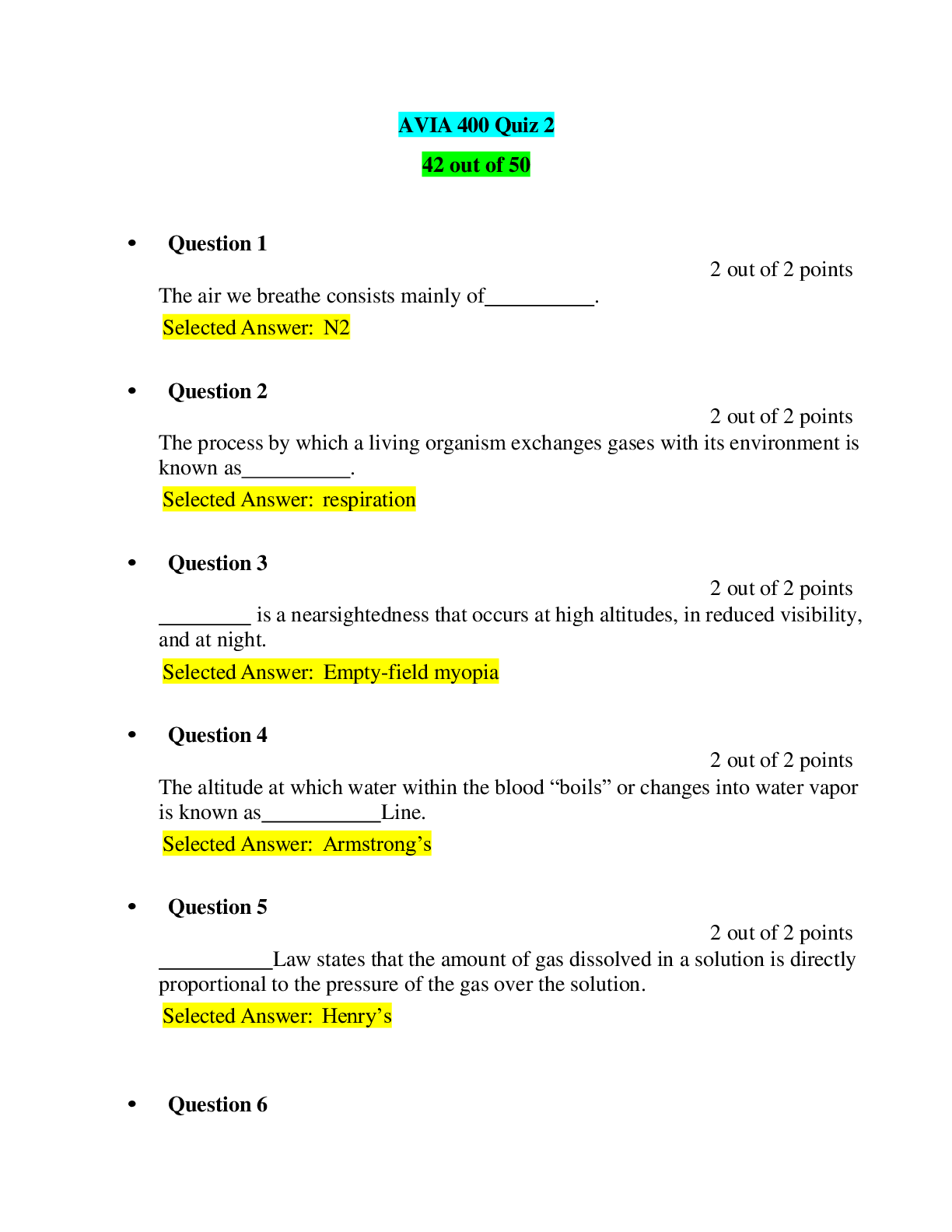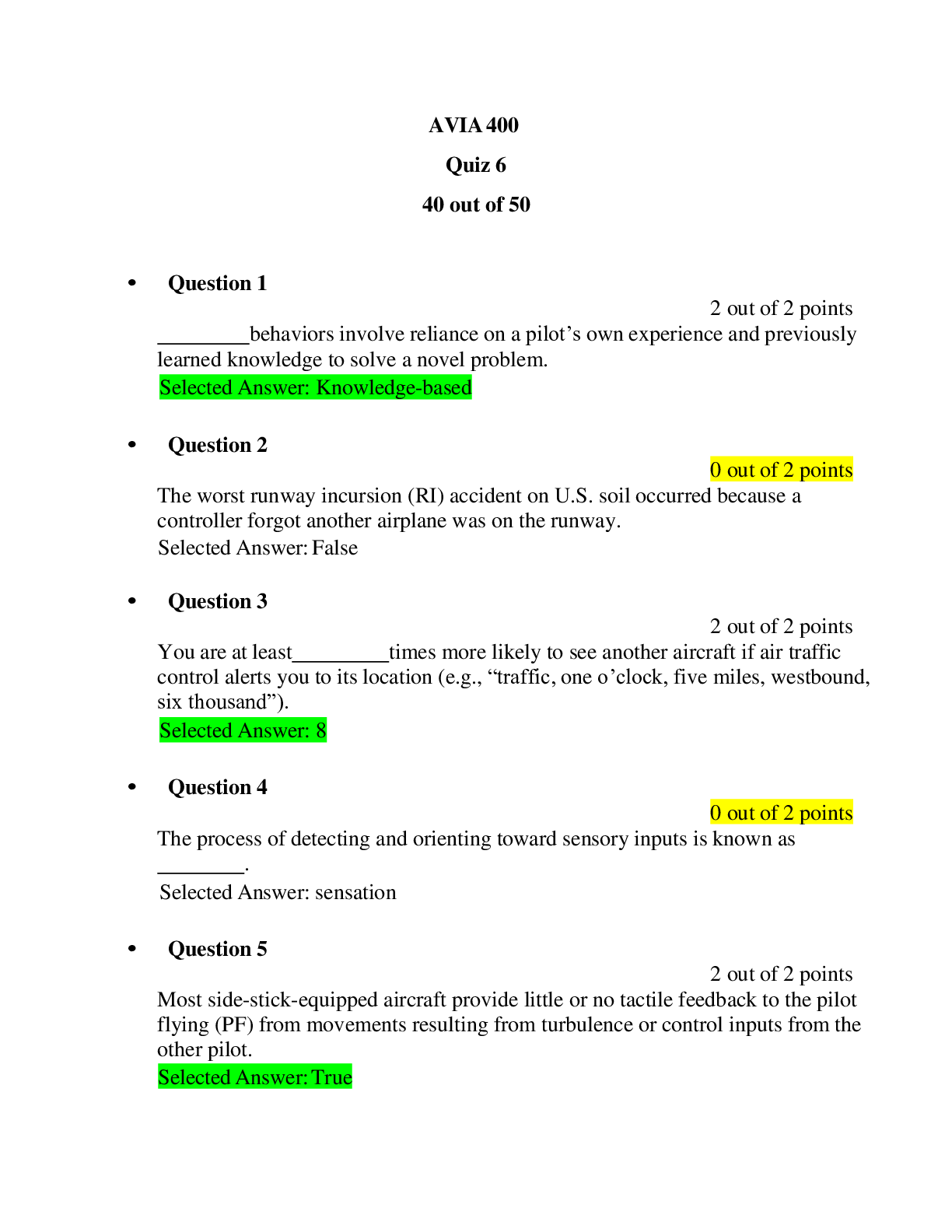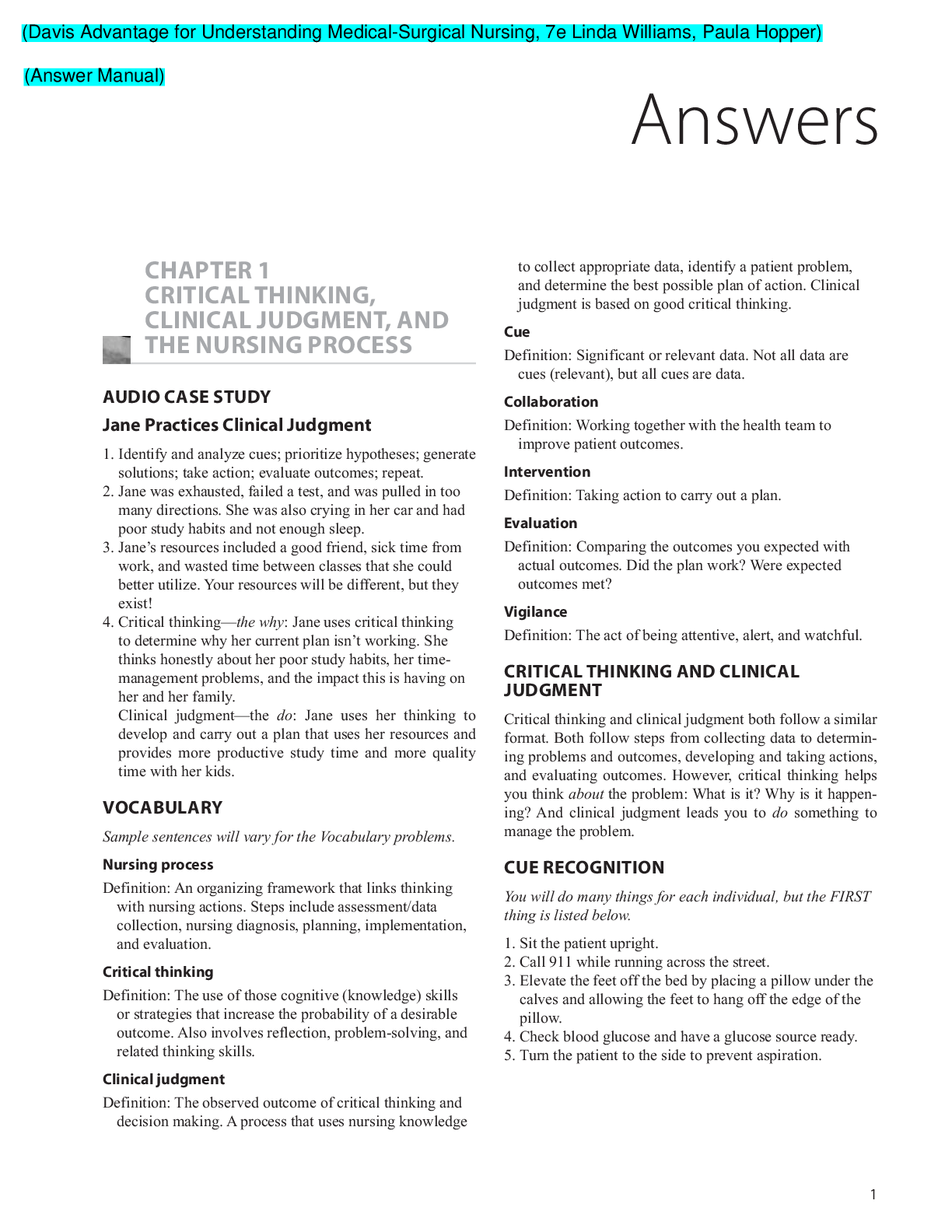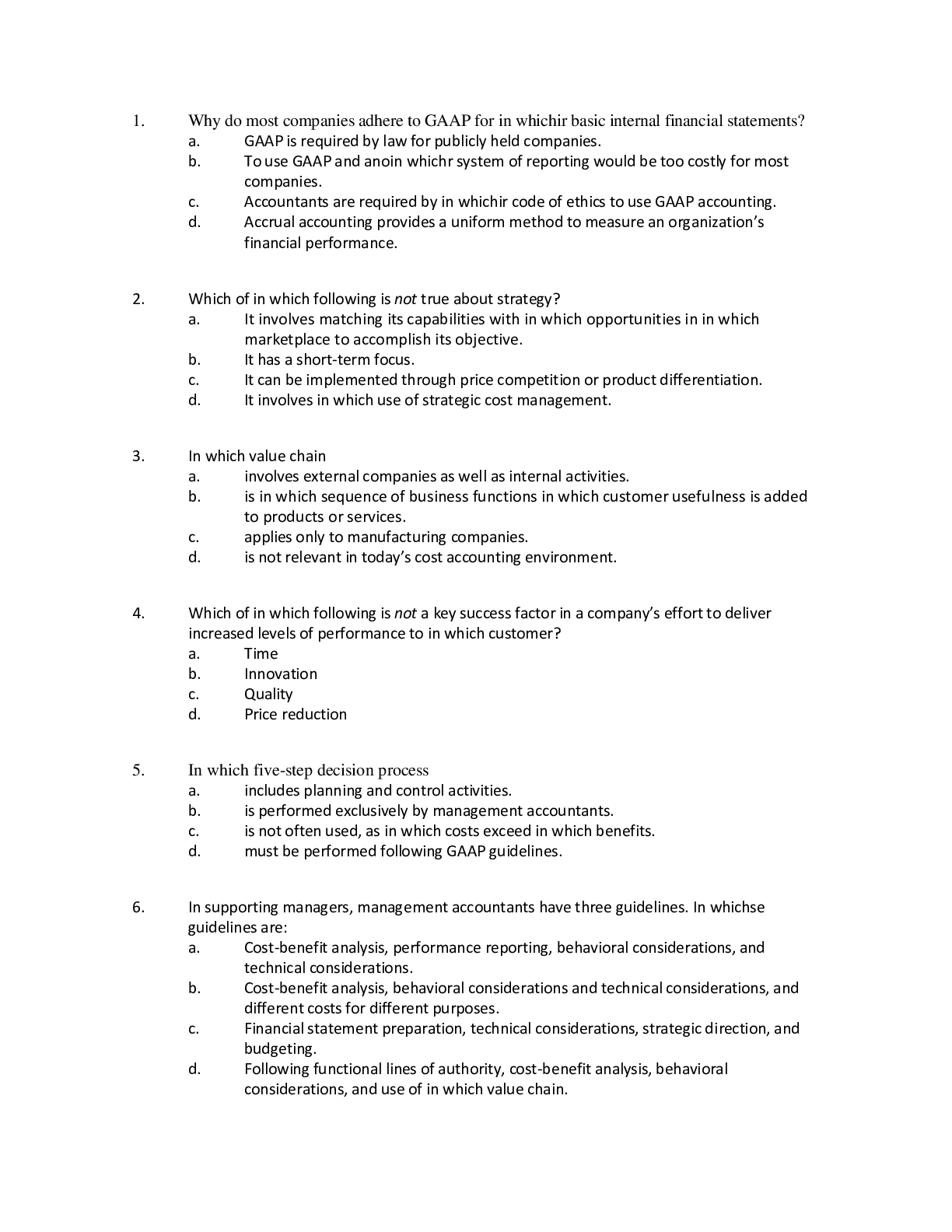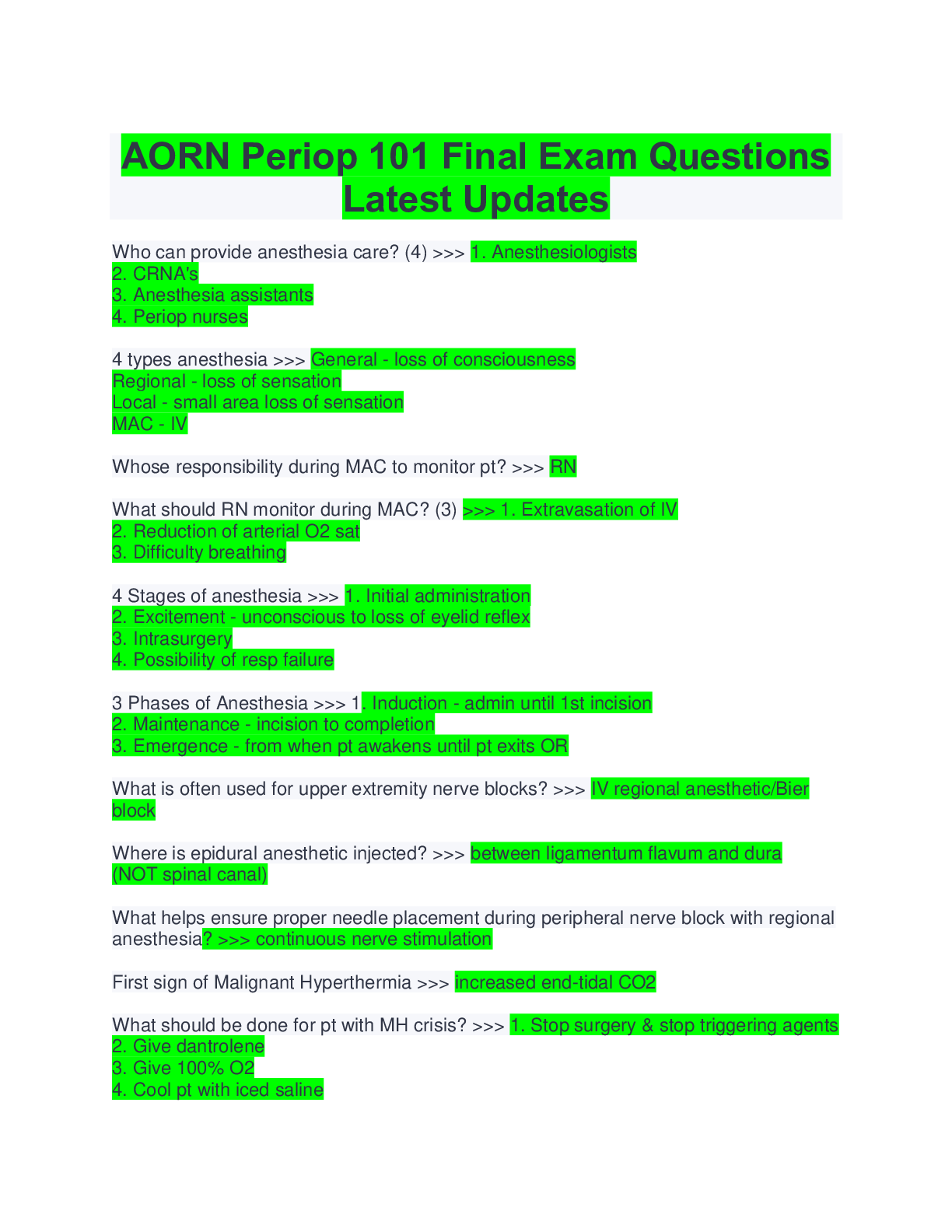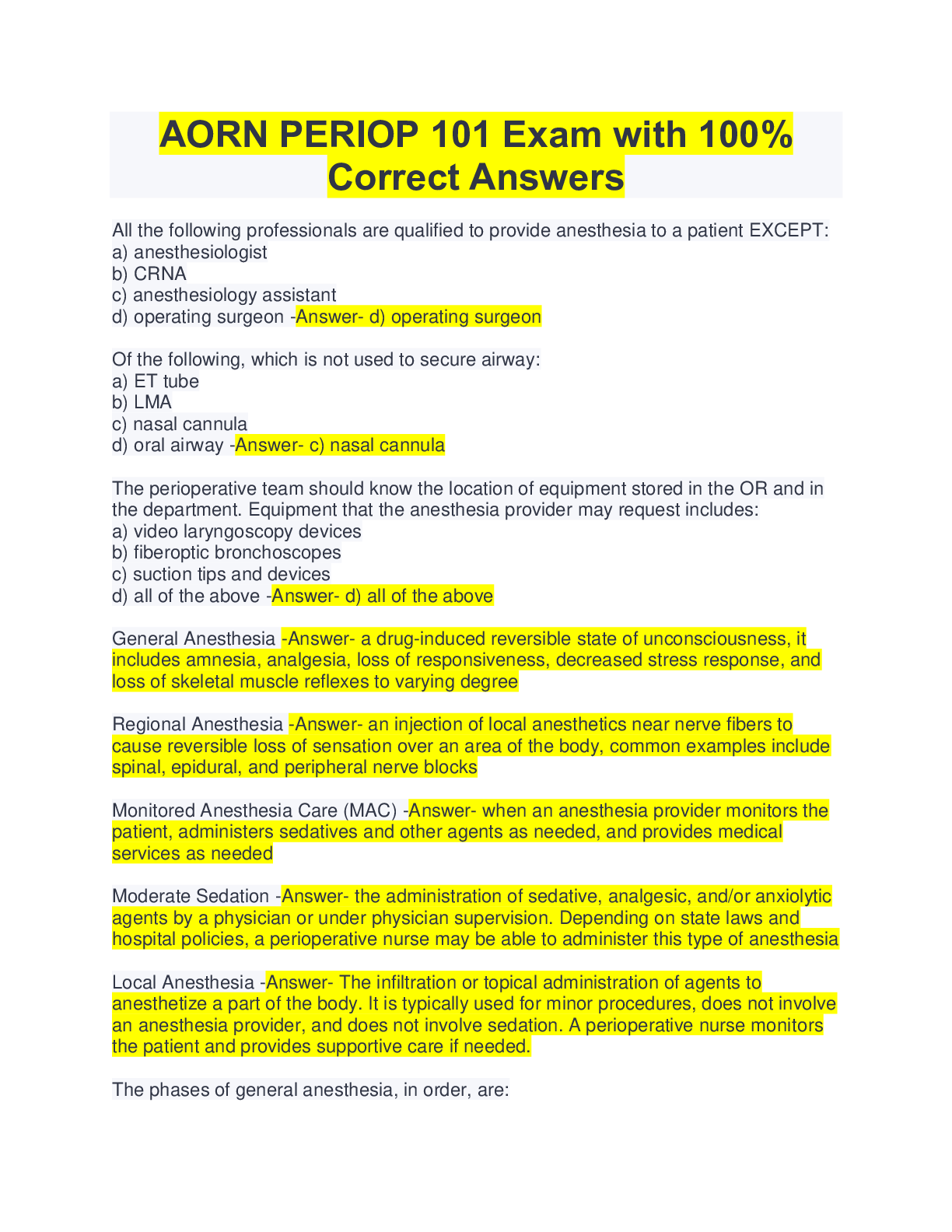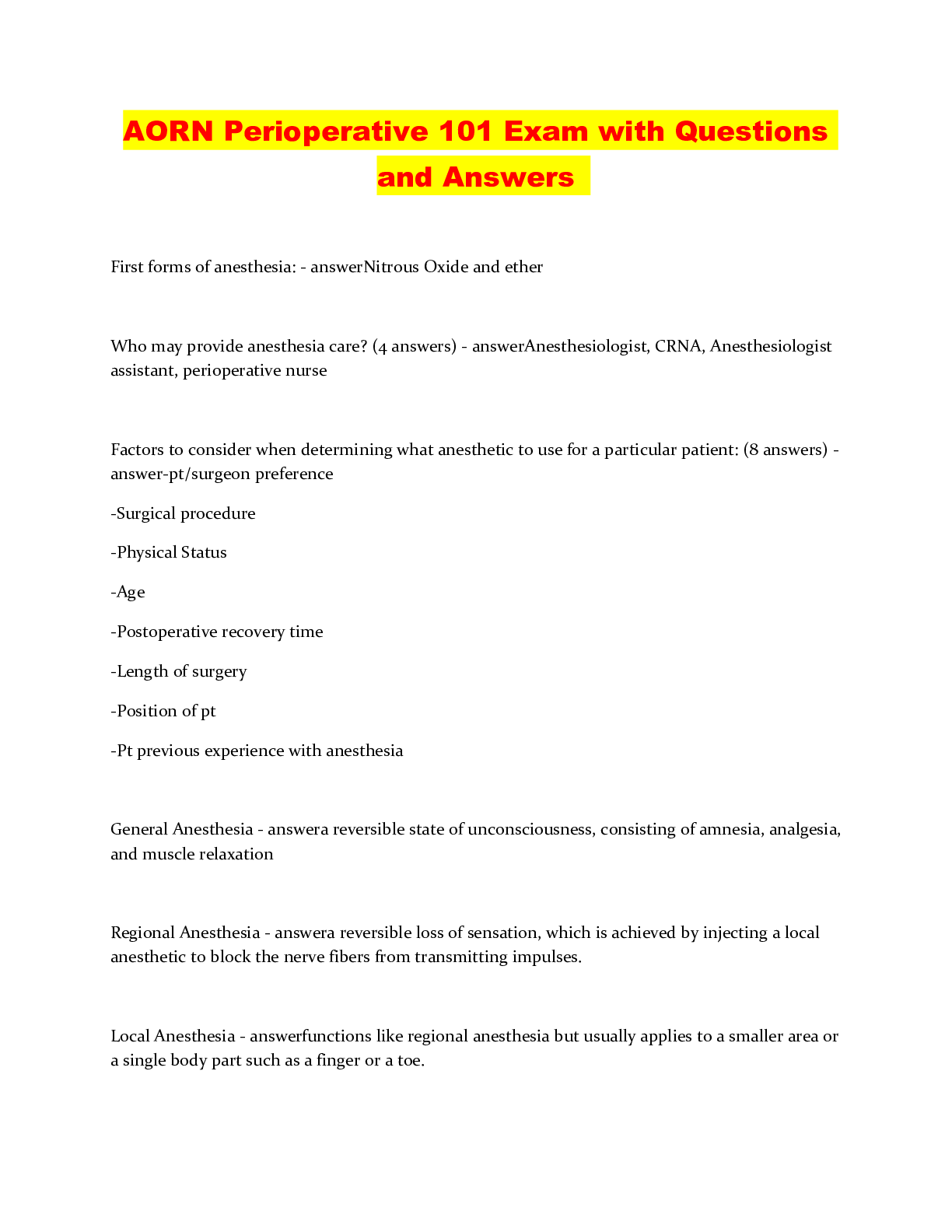Management > QUESTIONS & ANSWERS > P&C Insurance Exam Preview terms and meaning, 100% coverage, rated A (All)
P&C Insurance Exam Preview terms and meaning, 100% coverage, rated A
Document Content and Description Below
P&C Insurance Exam Preview terms and meaning, 100% coverage, rated A Reinsurance - ✔✔-Insurance for the insurance company. Reinsurance Department is responsible for helping to cover the insur... er's exposure to loss. Captive (Exclusive) Agents - ✔✔-Represent only one company Risk - ✔✔-A chance, possibility, or uncertainty of loss. Uncertainty of financial loss. Apparent Authority - ✔✔-The assumption that an agent has authority based on the actions or words of the principal. Pure Risk - ✔✔-Chance of only risk. Only type of insurable risk. Risk Retention Groups - ✔✔-Insurance companies that are owned by their members The only coverage these groups may write is liability insurance. Members of a group are in the same industry and require liability, insurance, which would otherwise be prohibitive in premium if obtained elsewhere. Stock Companies - ✔✔-Owned by stockholders. Main purpose is to earn a profit for its stockholders. Speculative Risk - ✔✔-Involves the chance of both loss and gain (gambling). Exposure - ✔✔-A condition or situation that presents a possibility of loss. Agent - ✔✔-The person authorized to act on behalf of the other. Responsibilities of the Agent - ✔✔-Collecting the initial premium. Delivering the policy. Explaining the coverage. Field underwriting each risk. Periodically reviewing the insured's coverage. Explaining coverage. Moral Hazard - ✔✔-Involves dishonesty on the part of the insured. Peril - ✔✔-The actual cause of a loss (Fire). Morale Hazards - ✔✔-Relating to the attitude of the insured (driving too fast and not wearing a seat belt). Needs Analysis - ✔✔-Necessary to identify the family exposures and insurance needs, and to estimate and find the funds necessary to pay for those needs. Express Authority - ✔✔-What the insurer intends to give to its agent through means of the agent's contract. Who does the agent represent? - ✔✔-Under the law of agency, agents represent insurers. Fiduciary - ✔✔-A person in a position of special trust and confidence charged with handling or supervising the affairs and funds of another. Reciprocal Company - ✔✔-A group of individuals who agree to share each other's losses Foreign Company - ✔✔-Operates within a state in which it is not centered and in which its home office is not located. Lloyd's Association - ✔✔-Voluntary organizations of individuals who agree to share in insurance contracts. They are not insurance companies. Each individual is responsible for the amounts of insurance they agree to write. Hazard - ✔✔-A condition that increases the chance of a loss. Implied Authority - ✔✔-Allows the agent to perform all of the usual and necessary tasks to sell and service insurance contracts. Implied authority may be established by custom or prior experience. Morale - ✔✔-A careless attitude or general indifference on the part of the insured toward the occurrence of loss. Domestic - ✔✔-A domestic insurer is incorporated in the same state where it sells insurance. Principal - ✔✔-The insurance company. Alien - ✔✔-A company that is incorporated or organized under the laws of any foreign nation, province, or territory. Purpose of Insurance - ✔✔-To transfer risk. Control (reduction) - ✔✔-Accomplished through loss prevention and loss control (burglar alarm). Captive Agency System - ✔✔-The agent represents only one company. Insurable Risk - ✔✔-The loss must be accidental from the insured's perspective. The loss must have a determinable value. The loss must be due to chance. Reinsurer - ✔✔-Insurers part of the insurance underwritten by another insurance company to reduce the possible large loss of the latter. Hazard - ✔✔-A situation or factor that increases the possibility of a loss. Mutual Company - ✔✔-Policyholders receive a return of unused premiums in the form of policy dividends. Dividends are not guaranteed. An insurance agent - ✔✔-The agent is the direct link between the insurance company and its insured's. The Law of Large Numbers - ✔✔-Operates under the principle that the larger the number of similar risks combined into one group, the less uncertainty there will be as to the amount of loss that group will incur. Fraternal Insurance Company - ✔✔-Provides limited insurance benefits to its members, usually restrict to life and health insurance. These organizations are formed to cover members of affiliated lodges, religious, and social organizations, and similar groups. Fraternal's may not be regulated as strictly as insurance companies that offer coverage to the general public. Federal Government Provides - ✔✔-Flood Insurance War Risk Insurance Federal Crop Insurance Unemployment Insurance Workers' Compensation Insurance Nuclear Energy Liability Insurance Adverse Selection - ✔✔-Risks that have a greater-than-average chance of a loss. Fraud - ✔✔-An intentional misrepresentation of material facts. A deliberate misrepresentation that causes harm. Estoppel - ✔✔-Once a right has been waived, it cannot be reinserted and used against the insured. Contract of Adhesion - ✔✔-The insurance company writes the contract, which is either accepted or rejected by the applicant. Modifications by the applicant cannot be made. As a result, courts generally have held that any ambiguity in the contract should be interpreted in favor of the insured. When doing so, the courts may rely on the doctrine of reasonable expectations, which states that a policy includes coverages that an average person would reasonably expect it to include, regardless of what the policy actually provides. Warranty - ✔✔-A warranty is a statement guaranteed to be true. A warranty may also include a promise by the insured that is stated in the insurance policy. A breach of a warranty, meaning that the statement is not correct, may give grounds for voidance of a policy. Misrepresentation - ✔✔-Involves a material fact. A material fact is a statement that may have caused the insurance company to reject the application or issue the policy with substantially different terms. Waiver - ✔✔-The voluntary relinquishment of a known right. It may be intentional or unintentional. Principal of Indemnity - ✔✔-A person should not profit from their loss or collect more than the actual cash value of a loss. Indemnification - ✔✔-The process by which an insured is restored to a preloss condition. Indemnity indicates the compensation in the form of payment, repair, or replacement has been given to an insured to make him whole again and to relieve them from loss. Contract of Utmost Good Faith - ✔✔-Imposes a higher degree of honesty on parties to an insurance contract. The insurer relies on the truthfulness on the application, and the insured relies on the company's promise and ability to provide coverage and pay claims. Both parties must know all material facts and relevant information; neither may attempt to conceal facts or deceive the other party. Representation - ✔✔-A factual statement on an application that is made to the best of one's knowledge. Personal Contract - ✔✔-Protects the individual who owns the property. Unilateral - ✔✔-Means one-sided. Insurance contracts are unilateral in that only one party (the insurer) makes any kind of enforceable promise. Insurers promise to pay benefits when a certain event occurs, such as death or disability. The applicant makes no such promise. Consideration - ✔✔-The exchange of value. In insurance, the insured's consideration is paying the premium. The insurance company's consideration is the promise to pay in case of a covered loss. Valid Contract - ✔✔-Must involve competent parties, legal purpose, offer and acceptance, and consideration. Twisting - ✔✔-The illegal act of inducing a policyholder, through misrepresentation, to cancel, lapse, forfeit, or surrender an existing policy purchase a similar policy from the selling agent. Concealment - ✔✔-The failure to disclose accurate information voluntarily. This includes material facts that may adversely affect the underwriting of the application. Underwriting - ✔✔-The process of evaluating the risk and exposures to potential clients 4 Basic Parts of an Insurance Contract - ✔✔-Declarations Insuring Agreement Conditions Exclusions Binder - ✔✔-An oral or written statement that provides immediate insurance protection for a temporary period. Ways underwriters classify and assign risks - ✔✔-Judgment Manual Experience Conditions - ✔✔-Set forth the insurer's and insured's rights and duties, including the procedure for resolving disagreement involving a loss between the insured and the company. The conditions state the ground rules for the policy. Declarations Page - ✔✔-The page of an insurance policy contains statements made by the insured on the application, information about the risk, and other pertinent data such as insured's name, effective date of coverage, deductible, premium amounts, coinsurance percentage, and location of the property. Pro Rata Method - ✔✔-Each company prorates its payment for the loss. Each company's share is the proportion that its limit of liability bears to the total of all applicable limits, whether collectible or not. Insuring Agreement - ✔✔-Contains the insurer's promise to pay for loss if the loss should result from the perils insured against. This section also indicates what coverages the contract offers. Liberalization Provision - ✔✔-Automatically broadens coverage without additional premium if there is a revision to the policy. Salvage - ✔✔-The insurance company has the right to any salvage when it settles a loss. The company may take possession of the damaged property and pay the insured the value of the loss. Terrorism Risk Insurance Act of 2002 (TRIA) - ✔✔-Voids any existing terrorism exclusions in commercial property and casualty insurance policies. Must produce at least $100 million in damage but cant exceed the $100 billion limit. Insurable Intrest - ✔✔-When the loss of or damage to the property will result in financial loss to the person. Endorsement - ✔✔-A form attached to the policy that changes the policy to fit special circumstances and is agreed to by both parties. Declarations - ✔✔-Contains information from statements the insured made in the application and information about risk insured. Specifically, it identifies the persons or entities that are the insured's and includes other pertinent data, such as the effective date of coverage, deductible, premium amounts, coinsurance percentage, location of the property, and the insurer's limits of liability. Short-Rate Method - ✔✔-Used when a policyholder cancels their policy before it reaches its natural expiration. The insured pays a penalty on the unearned premium for canceling early. Pro Rata Method - ✔✔-Used when the insurer cancels the policy; the refund is the premium paid for the unexpired term of the policy. Flat Cancellation - ✔✔-Takes place when the policy is terminated on the effective date. Loss Ratio - ✔✔-The ratio of the annual claims paid by an insurance company to the premiums received. Insuring Agreement - ✔✔-Contains the insurance company's promise to pay for loss if the loss should result from the perils insured against. This section also specifies the coverage the contract provides. Insurance Binder - ✔✔-A temporary, short-term evidence of coverage. Subrogation - ✔✔-When an insurance company pays the insured for a loss for which a person other than the policyholder is responsible, the insurer has the right to recover its loss from the negligent party. Fair Credit Reporting Act - ✔✔-Requires that insurance applicants be advised that a consumer report may be requested on them and the scope of any investigation resulting from the application. If coverage is denied or restricted based solely on the report, the applicant must be supplied with the name and address of the reporting company that collected the information. A notice must be given to the consumer no later than 3 days after a report is requested. Insured's Duties Following a Loss - ✔✔-Giving prompt notice of a claim Protecting the property from further damage Submitting to examination under oath if required Assisting the insurer (not the investigator) as required during the claim investigation procedure Declarations - ✔✔-Contain identifying information about the insured, the amount of coverage provided, a description of the property, and the cost of the po [Show More]
Last updated: 1 year ago
Preview 1 out of 34 pages

Also available in bundle (1)

P&C Bundle, top Questions and answers, latest updates.
P&C Insurance Exam Study Questions and answers, Top Examinable.
By Topmark 1 year ago
$24
9
Reviews( 0 )
Document information
Connected school, study & course
About the document
Uploaded On
Mar 13, 2023
Number of pages
34
Written in
Additional information
This document has been written for:
Uploaded
Mar 13, 2023
Downloads
0
Views
63




